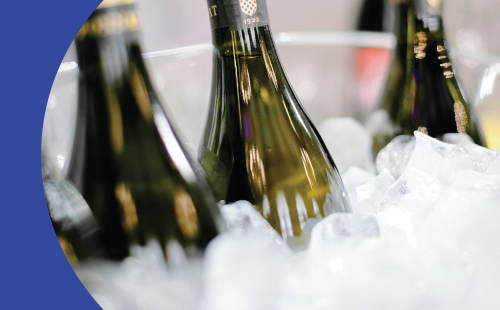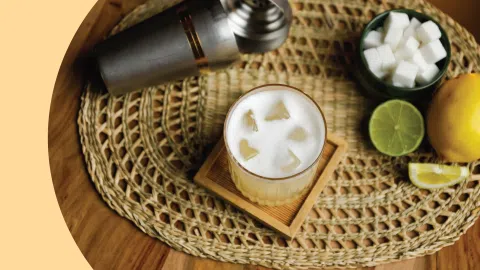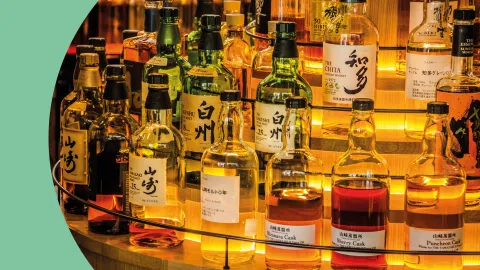Alcohol can freeze when exposed to extremely low temperatures, but any liquor with a proof higher than 50 will remain liquid in a regular home freezer. This applies to stronger spirits like vodka, tequila, whiskey, and gin. However, beverages like beer, wine, and liqueurs can freeze if left in your home freezer for an extended period.
Tossing a bottle of vodka in your (home)freezer and not worrying about it freezing is fantastic, as it lets you enjoy a chilled shot or create a cool beverage directly from the freezer. However, storing other spirits, such as whiskey and rum, in the freezer is not as common since it may lessen their taste. While they won’t turn into ice, to fully appreciate their flavors, you want to skip the freezer. If you like your spirits on the cooler side, our tip would be to not store your bottles in the freezer… But rather use the freezer to store and cool down your glasses! A perfectly cold glass will allow your drink to cool down slightly without altering its flavor and will make for a more pleasing drinking experience.
At What Temperatures Does Alcohol Freeze?
Pure 100% alcohol, or ethanol, freezes at an incredibly low temperature: -178°F (-117°C). To compare, water freezes at 32 degrees Fahrenheit.
However, most alcoholic beverages aren’t pure ethanol. Let’s take the example of vodka or gin: these spirits usually range at 40% ABV: which means that 40% of the bottle is pure alcohol, while the remaining 60% is water. The presence of water, which freezes at a way higher temperature than ethanol, will result in vodka or gin freezing at a temperature of approximately -17ºF (-27ºC).
So, the freezing point varies: the lower the alcohol content, the higher the freezing point. To pinpoint the freezing temperature of a specific bottle, you’ll need to know its alcohol content. You can check this on the label of the bottle.
Overview of liquor freezing points (Fahrenheit and Celsius)
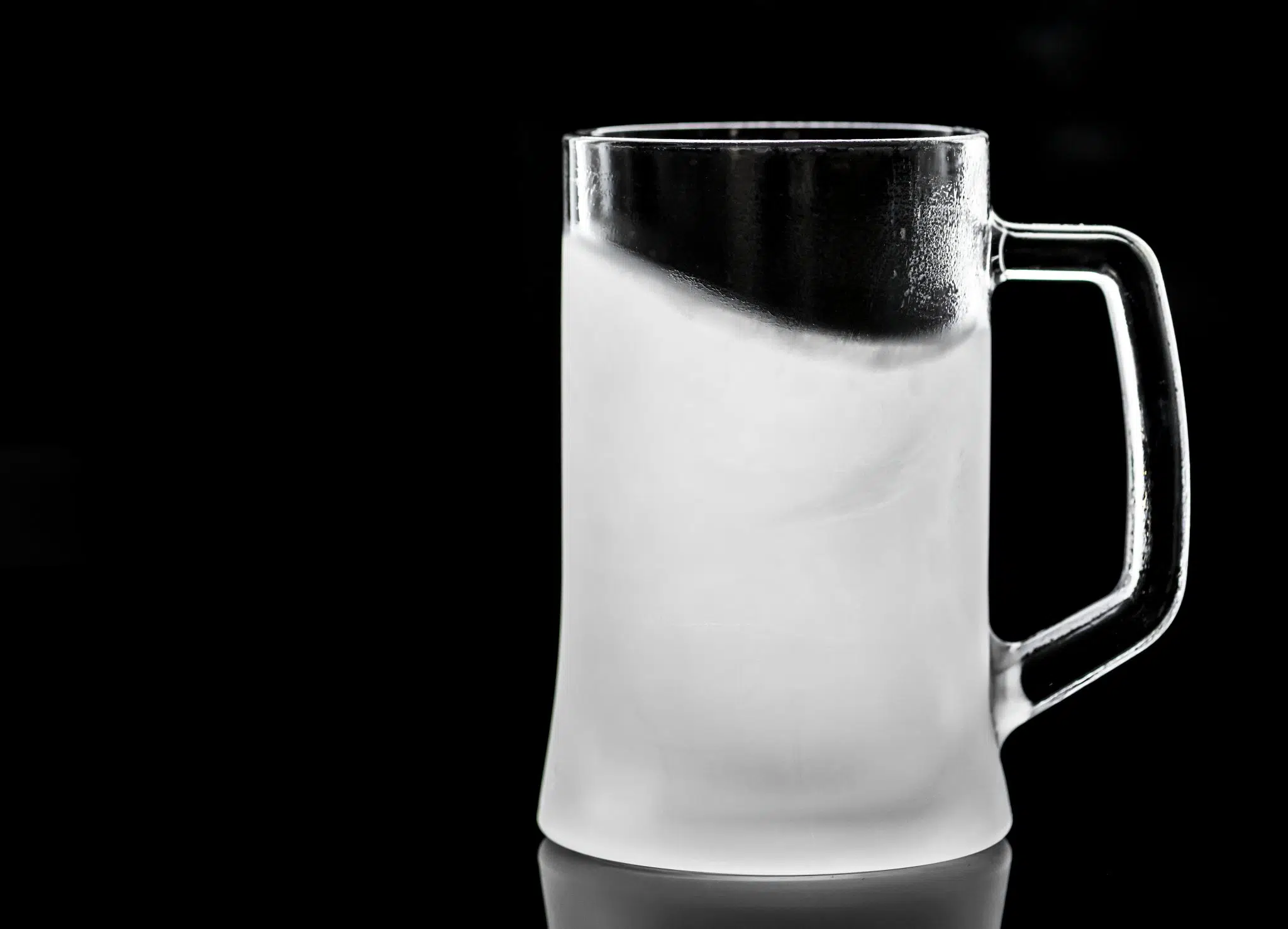
Now that you know how to check alcohol content, there is no need for a calculator anymore, as we’ve made an overview table of all important liquors and their freezing points. Both in Fahrenheit and Celsius and alcohol contents in proof and ABV.
However, keep in mind that these temperatures are only estimates as the freezing point of each liquid can vary depending on external conditions (such as pressure) and on its purity: the presence of tannins, sugar, or any molecule other than pure ethanol or water will change the exact freezing point of the mix.
Beverage | Proof | ABV (%) | Freezing Point (°F) | Freezing Point (°C) |
Beer | 8-20 | 4-10 | 30 – 23 | -1 to -5 |
Wine | 16-30 | 8-15 | 21 – 16 | -4 to -6 |
Whiskey | 80-100 | 40-50 | -13 to -22 | -25 to -30 |
Vodka | 80-100 | 40-50 | -17 to -22 | -27 to -30 |
Tequila | 80-110 | 40-55 | -17 to -27,5 | -27 to -33 |
| Gin | 80-90 | 40-45 | -17 to -19,5 | -27 to -29 |
- ABV (Alcohol by Volume): ABV is a standard measure worldwide and represents the percentage of alcohol in a beverage. It’s a straightforward way to understand the strength of a drink.
- Proof: Proof is a measure used in the United States to indicate alcohol content. It is double the percentage of alcohol by volume. For instance, a drink with 40% ABV is 80 proof.
Let’s take an in-depth look at each beverage:
Does Beer Freeze? (4-6% ABV)
With an alcohol by volume (ABV) ranging from 3% to 10% (6-20 proof), beer typically freezes at approximately 28°F (-2ºC). It takes 1-2 hours for beer to freeze. However, we don’t recommend this as it can compromise its quality and lead to bottles exploding.
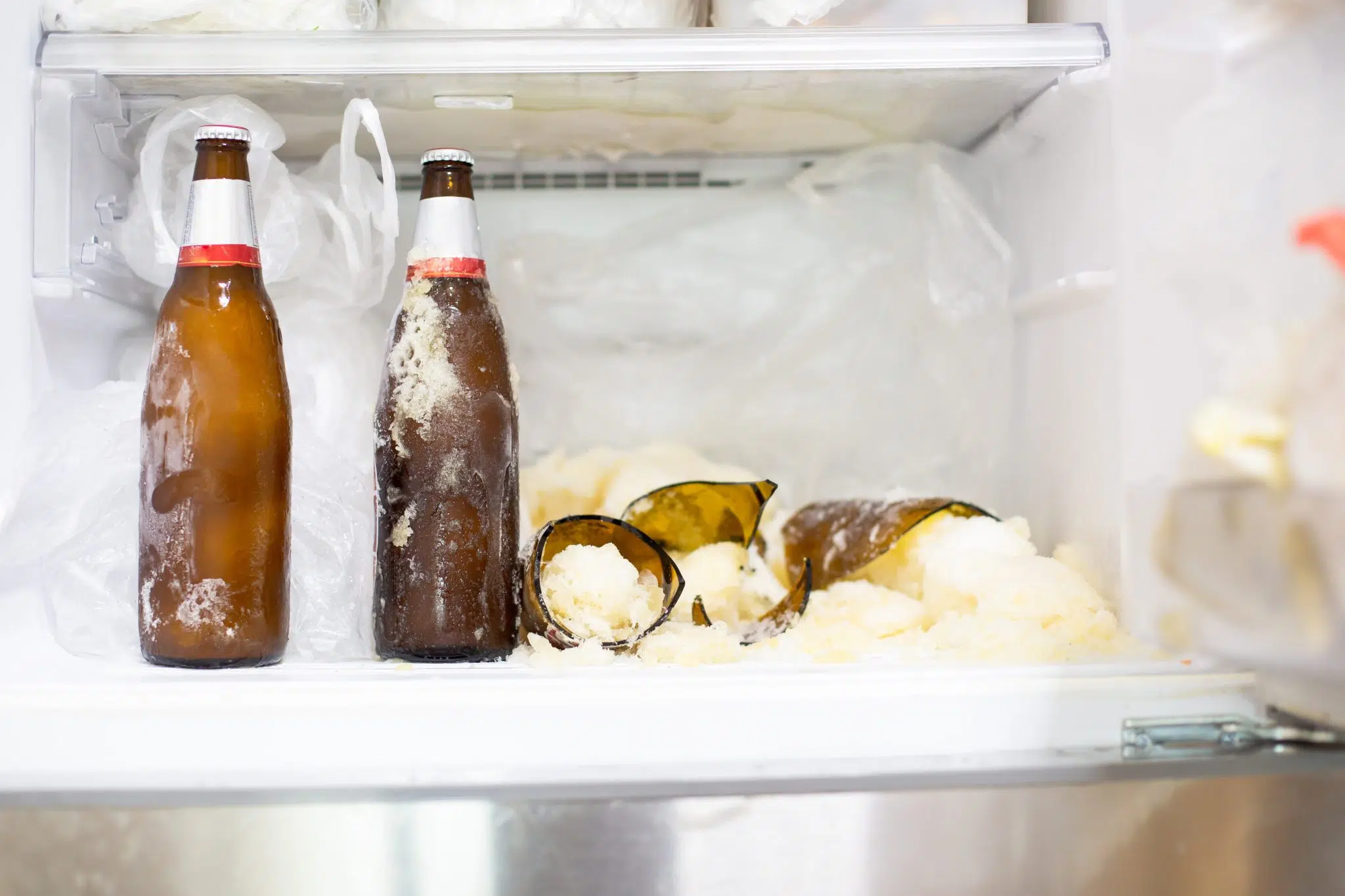
Does Wine Freeze? (8-15% ABV)
With an alcohol by volume (ABV) ranging from 12% 8% to 15% (16-30 proof), the wine typically freezes at approximately 16-21°F (-4 to -6ºC). It takes about 5 hours to freeze a standard bottle of wine. Although it is never recommended to freeze wine, if you were to mistakenly forget a bottle of wine in the freezer overnight, fear not: simply take it out of the freezer, wait for it to melt at its own pace, and it will be safe to drink once again!
Does Vodka Freeze? (40% ABV or more)
Vodka typically freezes at approximately -17°F (-27ºC). With a proof of 80 or more, vodka has a much lower freezing point than beer.
Vodka does not freeze in a standard home freezer set at 0°F (-18°C) (which the U.S. Food and Drug Administration (FDA) recommends), so it can be stored in the freezer for a long period of time. It is a perfect option both for crafting cocktails (using cold vodka will make the ice in the shaker or mixing glass melt slower, ensuring better control of the dilution) and for sipping on its own (the colder the vodka, the smoother the taste and the mouthfeel).
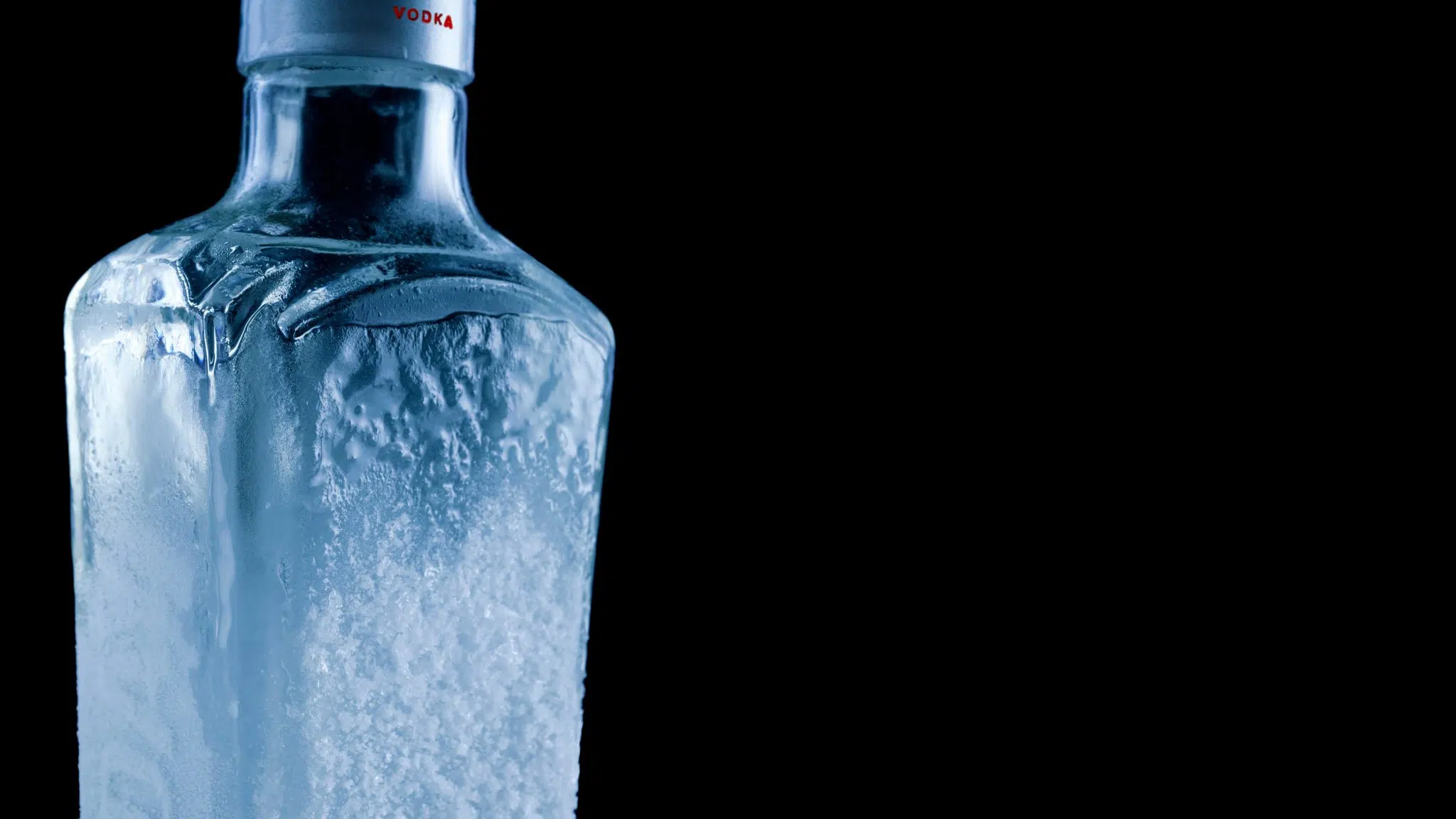
Does Whiskey Freeze? (40% ABV or more)
With a proof of over 80, whiskey typically freezes at approximately -13°F. We recommend avoiding keeping whiskey in the freezer: most whiskies are meant to be consumed at room temperature. If it’s really hot outside and you feel like your whisk(e)y could use a quick chill, it’s better to use ice cubes, a whiskey stone, or even a cold glass just out of the freezer to chill your whisk(e)y.
The same advice goes for rum (particularly aged rums), tequila, and mezcal. Freezing a spirit tends to mellow and hide some of its flavors: if it is indeed great in the case of a neutral spirit like vodka, which will only come smoother, it is not recommended for more complex spirits as you’ll miss out on a lot of their flavors and undertones.
Does Liqueur Freeze? (30-35 proof)
Liqueurs like Malibu can freeze in your home fridge. It is hard to pinpoint a single freezing point for this category of liquor as the sugar content in the bottle also affects the temperature at which the liquid will start to solidify. Some liqueurs may start to thicken or become slushy in the freezer but not freeze solid due to their sugar content.
FAQs
Does freezing alcohol ruin it?
Freezing alcohol doesn’t ruin it, but it can affect texture. Low-proof beverages may partially solidify, altering texture but not spoiling the alcohol. If you mistakenly freeze a bottle of liquor, simply wait for it to melt (at its own pace, do not heat it) and it will be safe to drink again. Avoid frequent freezing and thawing, and be cautious with carbonated drinks, which can expand and break bottles in the freezer.
Why does my liquor not freeze?
Your standard home fridge cannot freeze hard liquors because the freezing point of these alcohols is lower than the typical temperature of a home freezer. However, some lower-proof liqueurs or cocktails may become slushy or thicken in the freezer due to their sugar and lower alcoholic content.
What are popsicles with liquor?
Liquor-infused popsicles, often called “poptails,” are frozen treats that combine alcohol with various flavors. Mix alcoholic beverages like vodka, rum, or tequila with fruit juices, syrups, or other flavorings. The mixture is then poured into molds and frozen, producing icy, boozy popsicles. The alcohol content varies depending on the recipe, but it’s typically lower than in a standard cocktail to ensure a proper freezing texture.
What are examples of frozen cocktails?
Other frozen cocktails include the classic Frozen Margarita, which combines tequila, lime juice, and Triple Sec, and the Piña Colada, a tropical delight made with rum, coconut cream, and fresh pineapple. Additionally, you can enjoy a Frozen Daiquiri (rum, lime juice, and simple syrup) or a Frozen Mudslide (vodka, coffee liqueur, Irish cream, and ice cream) for a refreshing twist on traditional cocktails. These cocktails are usually mixed in a blender with crushed ice: this allows for a refreshing slushy texture and is also a great way to enjoy your favorite cocktails and spirits ice-cold without having to bother with monitoring your freezer temperature!
